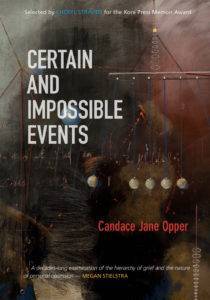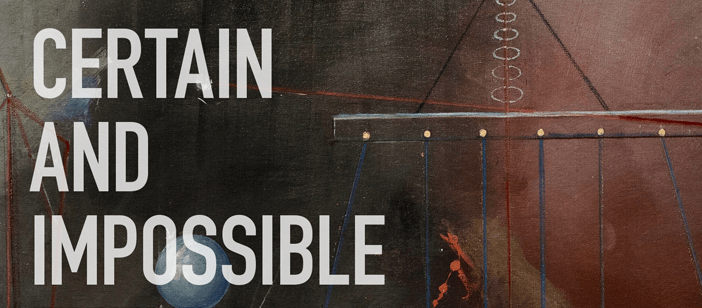Selected by Cheryl Strayed for the Kore Press Institute Memoir Award
From the Publisher: “Certain and Impossible Events orbits the death of a fourteen-year-old boy who shot and killed himself a week after Kurt Cobain’s suicide had become international news. Haunted by the hazy circumstances around her classmate’s death, Candace Jane Opper takes a kaleidoscopic lens to the cultural history of suicide in America, unearthing an invisible network and revealing the ways that no individual suicide—well-known or hardly documented—exists in a vacuum. Fusing personal narrative with history and science, Opper interrogates the ways suicide is handed down to us—from literature to YouTube, from middle school health class to sociological study, from the immutability of objects to the fluidity of oral history. In this candid and unsentimental epistolary essay, Opper invites us into her decades-long obsession with a boy she barely knew, creating space for herself and her readers to embrace a radical kind of unforgetting.”
About the author: Candace Jane Opper is a writer, a mother, and a visual artist whose work often explores the space between personal and cultural histories. Her essays have appeared in Guernica, Narratively, Longreads, Brevity, Literary Hub, and Vestoj, among others. She earned an MFA from Portland State University and is a recipient of the Creative Nonfiction Writers Fellowship. She grew up in the woods of Southern Connecticut and now leads an unfancy life in Pittsburgh with her husband and their son. Certain and Impossible Events is her first book. See more here: candacejaneopper.com
“Certain and Impossible Events is unlike anything I’ve ever read. It’s a powerfully original exploration of the many meanings of suicide and a beautifully written memoir of a particular kind of loss. I was impressed with the intellectual curiosity of this book, and also with its emotional rigor. With astonishing insight and candor, the author drew me into the endlessly unfolding mystery of her decades-long obsession with her teenage crush, a boy she scarcely knew, who killed himself at 14. Certain and Impossible Events is both a clear-eyed tour de force about suicide and an intimate and ultimately poignant portrait of one woman coming to grips with an experience that inexplicably shaped her. Perhaps most of all, I loved the quality of the prose. I was in this talented writer’s thrall from page one.” —Cheryl Strayed, Wild: From Lost to Found on the Pacific Crest Trail
“Certain and Impossible Events is a stunning gutpunch of a memoir for the heart and for the head. In laser-sharp, near-cinematic prose, Candace Opper both remembers and discovers the childhood friend lost to suicide, a decades-long examination of the hierarchy of grief and the nature of personal obsession. I kept putting the book down to remind myself to breathe. I kept picking it up to find out what happened next. I’ll keep picking it up for what it shows me about this beautiful mess of a world and how I can better walk through it.” —Megan Stielstra, The Wrong Way to Save Your Life
“In this profoundly moving meditation on the suicide of a classmate, Opper dives into the raw wound of a decades-old obsession, seeking not healing or closure but a deeper understanding of the changeling nature of the wound itself–cultural and personal, specific and universal, public and private. Unsentimental, lucid, harrowing, but ultimately restorative, Certain and Impossible Events left me breathless.” —Maryse Meijer, author of Heartbreaker and Northwood
“I am in awe of Candace Opper. Certain and Impossible Events is the shoebox full of memories that you don’t know what to do with, lovingly and unsparingly curated into a museum of infatuation, grief, obsession, and hard-won wisdom; it’s the love letter to your teenage self that you would write if you could. A memoirist who seeks the harshest truths about both her own life and the American mind, Opper draws you into her one history in a way that will re-examine yours.” —Sarah Marshall, Host of You’re Wrong About
“In Certain and Impossible Events, Candace Opper tells us the story of a girl who loses her adolescent crush to the most unknowable death: suicide. Opper carries the reader through the evolution of her grief, from awkward teenage obsession through to womanhood, where she comes to know almost every answer but the one she seeks. Certain and Impossible Events also comes with a side of 90s nostalgia and a fascinating exploration of suicide in pop culture. If you’ve ever felt the loss of a friend or acquaintance to suicide, but never felt there was a proper place for your grief, this one will resonate.” –Dese’Rae L. Stage, Founder of Live Through This
 Within the statistical parameters of sociological study, you are one of 322 American kids between the ages of five and fourteen who died by suicide in 1994. Had you waited less than a month, you would have turned fifteen and slipped into the 15-24 range (the official “adolescent suicide” demographic), which accounted for 4,956 deaths. Of those 4,956, 4,302 were boys, 3,550 of those boys were white, and 2,460 of those white boys used guns. That is about as fine a point as the statistics get. It is not the responsibility of researchers to staticize the presumed reasons why certain boys kill themselves, reasons that are too nuanced to quantify. On paper you are no more than a fourteen-year-old white boy with a gun.
Within the statistical parameters of sociological study, you are one of 322 American kids between the ages of five and fourteen who died by suicide in 1994. Had you waited less than a month, you would have turned fifteen and slipped into the 15-24 range (the official “adolescent suicide” demographic), which accounted for 4,956 deaths. Of those 4,956, 4,302 were boys, 3,550 of those boys were white, and 2,460 of those white boys used guns. That is about as fine a point as the statistics get. It is not the responsibility of researchers to staticize the presumed reasons why certain boys kill themselves, reasons that are too nuanced to quantify. On paper you are no more than a fourteen-year-old white boy with a gun.
When 14-year-old boys kill themselves, the banal assumption is that they want something—attention, reverence, idolization—and believe suicide is the way to get it. Of course, boys who end their lives are not around to savor whatever posthumous attention they think they might receive. He didn’t realize the consequences of his actions, I hear myself say about you, often. This is at least partly true. Teenagers’ misguided feelings of immortality are the result of their frontal lobes having not yet completed the process of neuronal myelination. “Think of myelination as the insulation on the electrical wires inside your house,” Psychology Today elaborated. “Without myelination in the brain, electrical signals from neurons fail to reach their destination.” Once they are fully myelinated—a process that can take males up to age 30—frontal lobes will theoretically forecast the ramifications of impulsivity.
You barely made it halfway to 30, which might explain your rather extreme recklessness, but it will never explain what you hoped to achieve. Popularity? Infamy? Revenge? Perhaps the mirage of your own glorious aftermath was enough to blur any sense of caution that may have crept into your peripherals. Or perhaps you hadn’t hoped to achieve anything. Maybe you were depressed or anxious or bipolar—now fairly standard diagnoses attached to adolescent suicide. Or maybe adolescence is a disorder of its own breed, with the power to greatly handicap insight. When I was fourteen, I smoked a joint packed with oregano, helped a friend superglue her lips together, and walked ten miles to the beach in the middle of the night. Our histories are a collage of mistakes and close calls and subtle triumphs. One could argue you had the ultimate lapse in judgment, but on what scale are we measuring? Maybe the rest of us just got lucky.
I am aware of only two surviving photographs of myself that were taken during the time I knew you. One is my eighth-grade yearbook photo, the other is from a photoshoot my mother staged of me flanked by the three musical instruments I played: clarinet, flute, and piano. That year was the drab period between my vampire phase and my grunge phase, when the stresses of adolescence had convinced me it was safest to disappear into the background. The result is a dreadfully unremarkable version of myself. My hair is long, black, and unbrushed. I am wearing a t-shirt that says HISTORY OF ART with nine stick-figure drawings rendered in the style of nine famous dead artists. I remember the shirt made me feel cultured without having to know anything about art. I am sort of hunched and sort of boyish, a year out from shedding what my mother called baby fat. It’s the peak of an awkward phase, and somewhere I knew this, though admitting it would have released a kind of vulnerability that I believed would destroy me. Instead I tried to do this trick with my lips to make them appear fuller, but my mom hit the shutter too soon and they just look stifled.
It was this version of me that knew you, for a period of six months in the middle of my eighth-grade year, which was also the exact middle of middle school. When I think of this time, it presents itself to me like an absence, a span that somehow floats above the timeline of my life, during which I was removed to play a role in a larger story and then returned, with none of my belongings, and told to pick up where I left off. This era has since assumed the timeless permanency of a film, one that loops every year from October to April, as though it’s playing on a grainy little TV in the corner of my existence.
Though I have assigned this time a sort of transcendental burden, I am careful not describe any of it as fate—a loaded concept that slaps a sort of lazy, prefabricated significance onto our experiences. The matter of our coexistence was nothing and I made it something, am still making it something. You, however, had a significance all on your own, even before your death begged us all to look harder. From the beginning I could not shake the feeling that you did not belong—to our small town, to our state of anonymity. You seemed alarmingly out-of-place to me, as though you weren’t supposed to be there at all, or that you had been written in last minute. I would later return to this idea over and over, fruitlessly busying myself with the reasons why people slip in and out of each other’s lives. I now attribute this sensation to the unreasonably epic workings of adolescent lust, the whole of which I could write off as juvenile but choose not to do so. Had it not been for this original magnetism I would not be writing this, nor would this need to be written—by me, at least. You may have ended up the same way; I, however, would not have ended up where I am: a woman who periodically Googles the name of a dead boy who will never experience or even imagine the internet, on the off chance that a key to your existence has made its way to the web, but—on a humbler level—because she still enjoys the way your name looks when she has typed it: like a confession.
This excerpt from Certain and Impossible Events by Candace Jane Opper is published here courtesy of the author and should not be reproduced without permission.

























